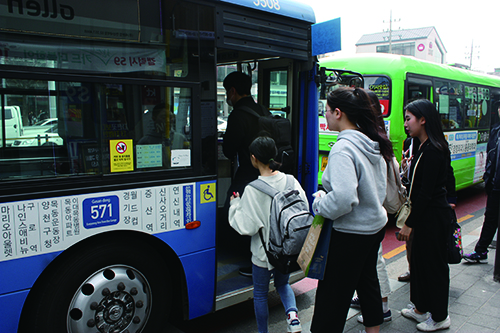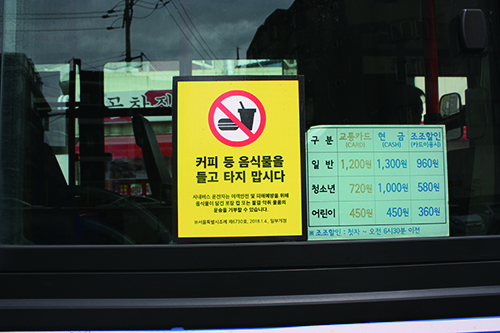Takeaway food and drinks on the bus have been banned in Seoul
 The pictogram banning takeaway containers is attached on the window of the bus in Seoul. /Photograph by Kim Ji-min |
"Do not bring any beverage or food into the bus.” This is the statement from the pictogram by the Seoul Metropolitan Government. It illustrates that not only drinks but also foods are banned on the bus. Recently, there were divided opinions about how much tolerance should be given to passengers with foods or drinks. However, numerous citizens seem to agree that there is a desperate need for the change of the law. According to “mVoting,” a mobile voting service in which citizens of Seoul can participate in the process of policy formulation, 49.43 percent of the voters have expressed that eating food on public transportation causes inconvenience to others. As carrying any food or beverages on the bus was banned lately, the first step has been taken towards a passenger-friendly environment. Korea has begun a transformation of civic awareness.
An ordinance banning food has been designed
Often, a lot of passengers and bus drivers have arguments about holding takeaway cups in the bus. Regarding this, starting from the end of last year, the Seoul Metropolitan Government stated that, in accordance with the sixth clause of Article 11, for the sake of passengers, bus drivers are allowed to bar passengers who are holding takeaway cups that contain any food or products that might cause harm or discomfort to the other passengers. Kang Byung-ju, the bus driver of Jinhwa Traffic Service, explained, “In summer, there are several passengers who bring their takeaway drinks. However, in the case of summer, a lot of people enjoy cool drinks, which are usually sweet and have sugar inside. When one of the passengers spills the drink on the bus, then the floor of the bus gets sticky. This situation makes other passengers uncomfortable. Therefore, it is true that banning food or drink is necessary.”
Variety of reactions exist for the revised law
As to this matter, Kiem Young-jin, the professor of the Department of Philosophy, expressed, “In fact, Korean citizens’ sense of morality seems to be not that high. Some people do actions of subordinating the public good to one’s own interest. Getting on the backdoor of the bus before others get off would be the example. Therefore, starting from this revision, it would be necessary for the government to lift citizens’ sense of morality.” Due to those carrying takeaway food, conflicts regularly take place between passengers and bus drivers. The Seoul Metropolitan Government explicitly put up signs at every bus stop to inform that passengers might be prevented from boarding the bus if they are holding food or drinks. As a result, the revision of the law has obtained positive responses from the drivers.
 The pictogram banning takeaway containers is attached on the window of the bus in Seoul. /Photograph by Kim Ji-min |
Driver Kang mentioned, “There were quite a few of passengers, who used to leave their takeaway cups behind. Seeing these leftovers, some commuters filed civil complaints. Once the civil complaint is accepted, we have to submit a state of reasons. However, now with the revision of the law, at the foundation level, we did not see much effect. Though, we still expect that there will be much improvement.” Also, considerable citizens, who use the bus frequently, showed positive reactions. Kim Eun-woo (Junior, School of International Liberal Studies) from Waseda University, said, “Bus is one kind of a public transportation that everybody uses. When a passenger brings a cup that might discomfort others or something hot, there is a danger the passenger might spill. It is necessary for others to respect each other, since we all pay to get on the bus.”
There are still concerns about the revision
In accordance with the sixth clause of Article 11, bus drivers can prevent passengers from holding takeaway containers with any food or food that might cause harm or discomfort to other passengers. Nonetheless, due to the absence of legal remedy, there can be some friction between the bus drivers and the passengers. Usually, when accidents related to the takeaway food and drinks occur, the passenger, who inconvenienced other passengers, was the one responsible for the accident. Due to the revision of the law, now the bus drivers are also liable for the accident, after all. This has led them to be responsible for the accident take place in the bus. Likewise, they stop passengers holding takeaway food from getting on the bus. Nevertheless, the reality is legal remedy cannot be actualized, seeing that it is an ordinance by the Seoul Metropolitan Government.
Also, some citizens say that the standard of the “food that might damage or inconvenience others” is very ambiguous. However, the announcement made on April 2nd by the Seoul Metropolitan Government clarified the term by specifying, drivers can ban food that might be affected with light damage. The term “light damage” includes happenings such as dropping food accidently on the floor of the bus. If packed contents are not for eating in the bus purpose, then passengers are permitted to carry them. On the other hand, contents such as wrapped food, vegetables, or meat with the plastic bags are allowed.As stated in the notice, the Seoul Metropolitan Government amended the clause by collecting the opinions of citizens, drivers, and the union of intra-city bus transportation services. In this way, with continuous promotion, the Seoul Metropolitan Government is planning to create safe and fresh bus environment.
The policy implies the growth of civic awareness
In terms of public sanitation and safety, there has been a growth in civic awareness. Unlike the past, when people used to bring their own packed foods or takeaway beverages, passengers are now advised to refrain from carrying them. Lee Weon-bok, another bus driver of Jinhwa Traffic Service, commented, “Due to this revision, passengers now acknowledge that bringing any food or beverage is not tolerated. This movement will make the buses cleaner.” Also, by this revision, it became a win-win game for all passengers and bus drivers. Hong Yun-gi, the professor of the Department of Philosophy asserted, “When one spills a hot drink to another passenger, the one who spilled is responsible for the case. However, since there is no one to be hurt by banning drinks on the bus, the bus drivers are pleased to let passengers stay safe.”
The recognition of civic awareness changed as time passed by
Back in the 70’s and 80’s, people used to smoke freely in the bus. Some people used to complain about it, but it was not a big deal. With reference to this, Professor Hong said, “This is the case in which private and public spheres crash. At this moment, victim would be the one who is indirectly smoking, and the assailant would be the actual smoking one. In the past, we were not able to differentiate between victims and assailants. However, nowadays civic awareness has shifted to victim-centered one. We now started to acknowledge the existence of the ‘victims.’”
Some people complain that the definition of victim is subjective. The one who brings takeaway cup can also be the victim, since he or she is deprived of the right to drink. Professor Hong explained, “In modern society, advantages and disadvantages coexist. Consequently, freedom and rights always have conflicts. However, there is a flow in civic awareness that those who seem to be victims are being protected. In this sense, those who seek to satisfy their thirst were more like assailants than victims.” He added, “The process of figuring out the assailant and the victim is essentially needed. The process could be troublesome. In this regard, civic awareness can be the standard to classify the social norms. This will lead to a wholesome civic life.”
It was easy to spot people carrying a takeaway drink or packed food on the bus. Driver Kang said, “Whenever I go driving to crowded places such as Gangnam, or Apgujeong, it was very common to see people leaving behind their takeaway cups at the bus. It is quite frustrating to clean up everything passengers have left.” However, with the revision of the law, the Seoul Metropolitan Government advertised that bringing takeaway food and beverages on buses would not be approved by putting up a pictogram or making an announcement over the in-car speakers. At present, initialized by the Seoul Metropolitan Government, the buses of Seoul are heading toward a food and drink-free environment. Also, with citizens calling eating in the bus or such misdemeanors into question, Korea has reached the first base toward mature civic awareness. Driver Lee added, “I hope the Seoul Metropolitan Government promotes the revision more frequently than nowadays, so that all of passengers can use the bus safely.”

